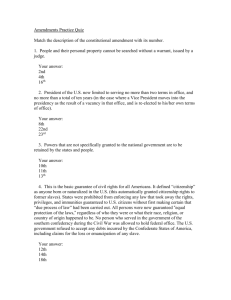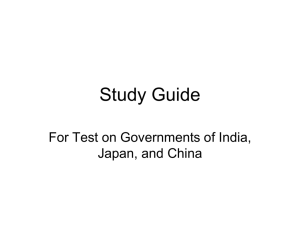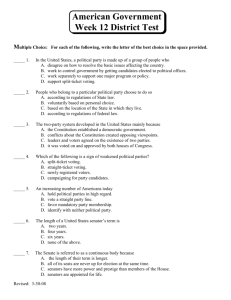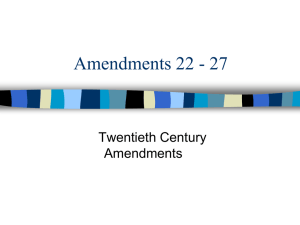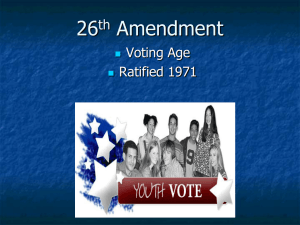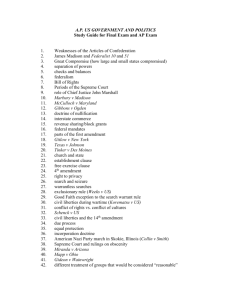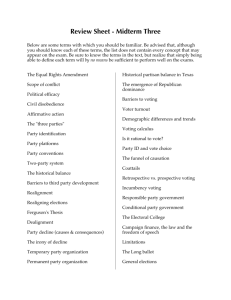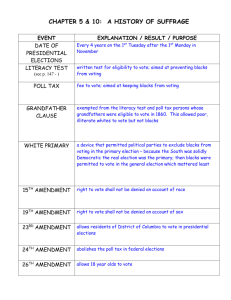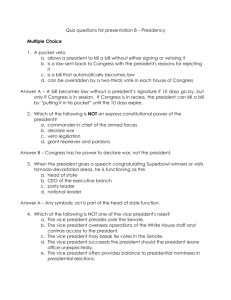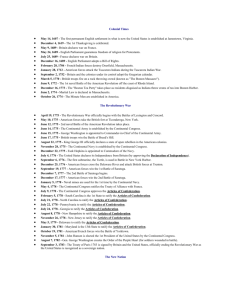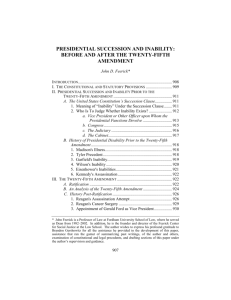27 Amendments - Twyman
advertisement
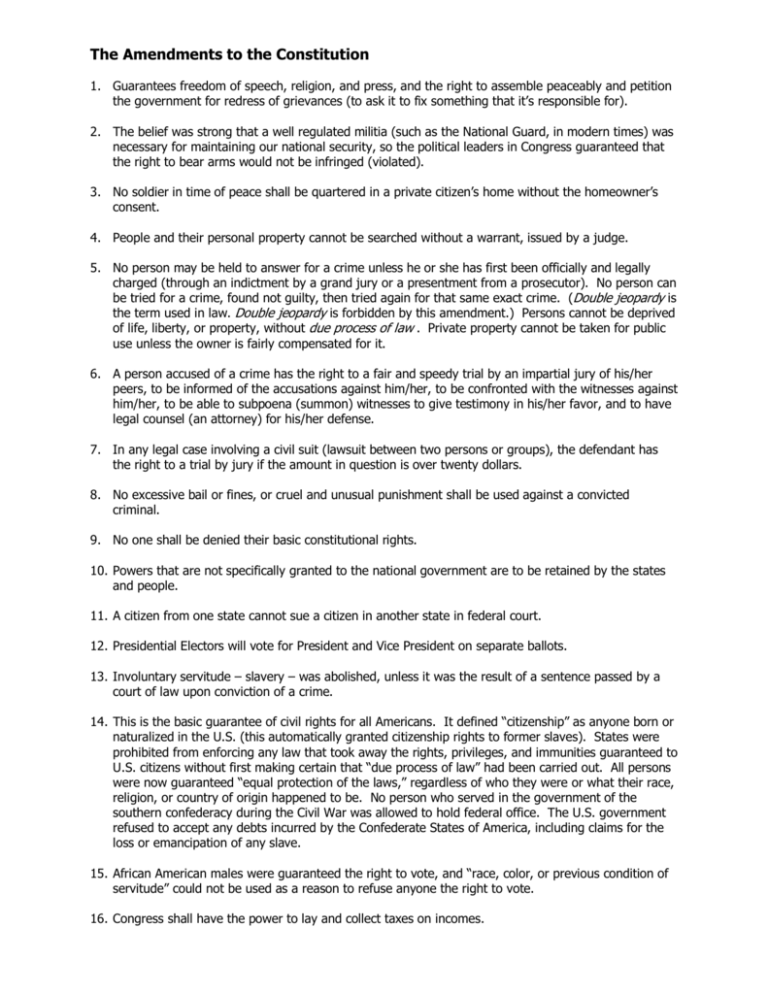
The Amendments to the Constitution 1. Guarantees freedom of speech, religion, and press, and the right to assemble peaceably and petition the government for redress of grievances (to ask it to fix something that it’s responsible for). 2. The belief was strong that a well regulated militia (such as the National Guard, in modern times) was necessary for maintaining our national security, so the political leaders in Congress guaranteed that the right to bear arms would not be infringed (violated). 3. No soldier in time of peace shall be quartered in a private citizen’s home without the homeowner’s consent. 4. People and their personal property cannot be searched without a warrant, issued by a judge. 5. No person may be held to answer for a crime unless he or she has first been officially and legally charged (through an indictment by a grand jury or a presentment from a prosecutor). No person can be tried for a crime, found not guilty, then tried again for that same exact crime. (Double jeopardy is the term used in law. Double jeopardy is forbidden by this amendment.) Persons cannot be deprived of life, liberty, or property, without due process of law . Private property cannot be taken for public use unless the owner is fairly compensated for it. 6. A person accused of a crime has the right to a fair and speedy trial by an impartial jury of his/her peers, to be informed of the accusations against him/her, to be confronted with the witnesses against him/her, to be able to subpoena (summon) witnesses to give testimony in his/her favor, and to have legal counsel (an attorney) for his/her defense. 7. In any legal case involving a civil suit (lawsuit between two persons or groups), the defendant has the right to a trial by jury if the amount in question is over twenty dollars. 8. No excessive bail or fines, or cruel and unusual punishment shall be used against a convicted criminal. 9. No one shall be denied their basic constitutional rights. 10. Powers that are not specifically granted to the national government are to be retained by the states and people. 11. A citizen from one state cannot sue a citizen in another state in federal court. 12. Presidential Electors will vote for President and Vice President on separate ballots. 13. Involuntary servitude – slavery – was abolished, unless it was the result of a sentence passed by a court of law upon conviction of a crime. 14. This is the basic guarantee of civil rights for all Americans. It defined “citizenship” as anyone born or naturalized in the U.S. (this automatically granted citizenship rights to former slaves). States were prohibited from enforcing any law that took away the rights, privileges, and immunities guaranteed to U.S. citizens without first making certain that “due process of law” had been carried out. All persons were now guaranteed “equal protection of the laws,” regardless of who they were or what their race, religion, or country of origin happened to be. No person who served in the government of the southern confederacy during the Civil War was allowed to hold federal office. The U.S. government refused to accept any debts incurred by the Confederate States of America, including claims for the loss or emancipation of any slave. 15. African American males were guaranteed the right to vote, and “race, color, or previous condition of servitude” could not be used as a reason to refuse anyone the right to vote. 16. Congress shall have the power to lay and collect taxes on incomes. 17. Election of Senators was granted to the people of each of the states. 18. The manufacture, transportation or sale of alcoholic beverages was prohibited. 19. The right to vote cannot be denied because of a person’s sex. 20. Shortened the period of time between federal elections (first week of November in even numbered years) and the day that officials were sworn into office. Called the “Lame Duck Amendment” because it gave “lame duck” officials (those who were not going to be sworn in, but were still in office) a shorter period of time to pass laws that tended to enrich their lives or the lives of their friends and political allies. Presidential inauguration day (when he/she is sworn in) moved back from March 4 to January 20. Members of Congress are now sworn into office on January 3 instead of March 4 of odd numbered years. 21. Repealed a previously-ratified amendment; the Prohibition Era in America was over. 22. President of the U.S. now limited to serving no more than two terms in office, and no more than a total of ten years (in the case where a Vice President moves into the presidency as the result of a vacancy in that office, and is re-elected to his/her own terms of office). 23. People who live in Washington, D.C. are allowed to vote for President and granted three electoral votes, the minimum number of Electoral College ballots. (Before this amendment, residents of the District of Columbia were prohibited from voting for President.) 24. People can not be denied the right to vote in federal elections – either primaries or general elections – because they have not paid a tax on voting. (Before this amendment, poor people, and most particularly ethnic and racial minorities, were effectively kept from voting by such “poll taxes” that they simply could not afford to pay. This prohibition on poll taxes was later extended to state and local elections, as well.) 25. Established procedures to follow in the case of presidential death and/or disability. States for the first time in the Constitution that the Vice President, when taking over the office of President after a vacancy occurs, has all of the powers and responsibilities of the presidency. In case of presidential disability, the Vice President and a majority of his/her Cabinet officers may send written notice to the Speaker of the House of Representatives and the President Pro Tempore of the Senate that the President of the U.S. is “unable to discharge his duties and responsibilities,” the Vice President becomes Acting President. When the President is able to resume the duties that his office requires, he may send written notice to the congressional leadership that he is returning to his office. If the Vice President and a majority of the Cabinet officers disagree, they may send written notice to the leaders of Congress. Congress will then decide who should take office as President. 26. Established the minimum age requirement for voting in federal elections at eighteen years. 27. Congress may pass a law increasing their salaries, but cannot collect it until after there has been a federal election.
